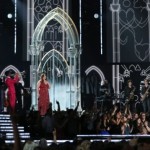Each week in God and Country Music, Nick Rynerson gives country music a chance and examines the world of Americana, folk, alt-country, and popular country music.
For a time, American folk music was for the poor by the poor, written to escape the hardships and express the pain of rural brokenness. From this pain came the blues in the black community and bluegrass in the white community. Both of these styles reached the deepest and darkest places of the American landscape and made country music what is today. The roots to that tree were these obscure, impoverished musicians.
But almost as soon as it started, another demographic began to take notice of this great music. Men like W.C. Handy and Harry Smith, professional “big city, white collar” musicians started digging around the coal mines and cotton plantations for hidden musical diamonds and then bringing this music back to the bourgeois.
Lets take Harry Smith, for example. Harry Smith is one of the greatest things to happen to folk music and maybe one of the oddest. He became a bohemian hero when in 1952 he put out a compilation of old folk music between 1927 and 1932 that he had collected. It sounds odd now, a guy changing the music world with a mix tape of old tunes, but that’s how it happened. This mix tape, The Anthology of American Folk Music became the building blocks for the folksinger movement in New York City that produced the likes of Bob Dylan and influenced countless outlaw, acoustic and alternative country acts. And it is a truly amazing compilation. A music lover can get lost in the eighty-something tracks performed mostly by poor reverends and coal miners.
Middle Class white-collar folks (like me) who have never known the troubles associated with a life of aimless wandering and sharecropping have taken over country. It’s like this at most Americana/country shows that I get the chance to go to. And I’ve sometimes wondered to myself if my love of this music cheapens the value of it. Should I be able to take part in this music with my lack of social identification.
I’ve come to a conclusion that is as much theological as it is musical and I believe that this “gentrification” is not gentrification at all. It is really all about identification. We should not be shocked or put off by a crowd that doesn’t look much like the storyteller because the stories being told are universal. It doesn’t take a rambling Mississippi sharecropper to relate to “James Alley Blues”, just someone who has been hurt before.
God has wired man a certain way and certain stories, particularly musical stories, have appeal to each and every culture. It’s been said that music is the universal language, so when the songs speak truth it is due to expect universal response. Just like the Greek response to the Jewish Messiah, Yeshua in the New Testament, men with seemingly nothing in common with the source are drawn to something so unlike themselves because the message somehow seems so deeply relatable that it resonates in the innermost parts of the soul. So don’t be afraid to resonate with truth from some far and distant culture, chances are it has something to say to you right where you’re at.















